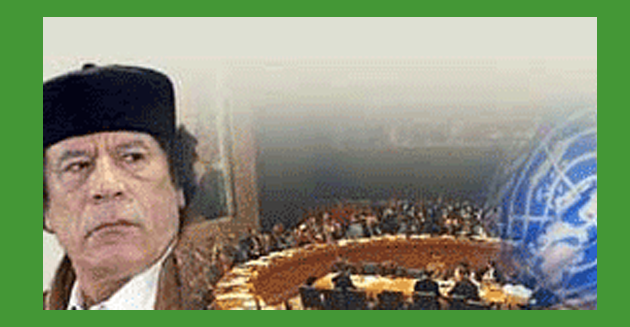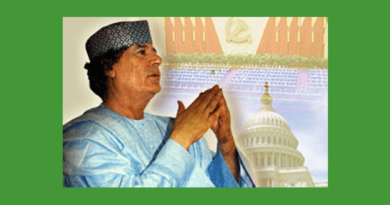A Message to UN Reform
08.05.2006
UN Reform: A Message to All Countries of the World
There has been on the global level a lot of talk recently about reform and democracy. They are attractive slogans that can only be rejected by a dictator or a reactionary. A dictator naturally opposes democracy. The reactionary abhors reform. But the whole debate would be rejected by all if it proves to be an exercise of selective propaganda or a misuse of attractive slogans to serve hidden agendas other than those of reform and democracy.
If we are truly serious about reform and democracy on the global level, then we must start with the peak of our world. The peak and head of the world is the United Nations. The General Assembly is our world’s parliament. If the parliament of the world were not democratized, it would not be possible to accept any call to reform or democratize any national parliament or government in any country in the world. The question is: how do we reform and democratize the UN General Assembly (the World Parliament)? The answer is very clear and simple. The world parliament must be given the same mandate enjoyed by a national parliament in any established democracy. Thus, the General Assembly would be the legislative body, the Security Council would be the executive branch and the International Court of Justice would discharge the task of the judiciary.
The proposal made by the Secretary General of the UN does not merit a second thought. It is utterly irrelevant and so colorless that it does not deserve any consideration.
The genuine radical reform dictates the transfer of the powers of the Security Council to the General Assembly. Its resolutions, rather than those of the Security Council, should be the legally binding ones. It is so because the General Assembly is the forum where all the member states meet. Unlike the Security Council, all member states are represented in the General Assembly on an equal footing but without any powers. What is the use then of the sovereign equality among member states? Indeed what is the use of the General Assembly itself if it is nothing but a decorative icon? What is the difference between the UN General Assembly and London’s Hyde Park when both are places for speechifying? The Assembly now is just like the Okaz Market in pre-Islamic Mecca which served as a forum to recite poems hailing one party and tarnishing another.
The Security Council must be transformed into a tool for the implementation of the resolutions of the Assembly. If this could not be achieved then the General Assembly must be abolished. The costs and expenditures incurred by the Host Country and the member states would thus be saved. The Security Council shall remain provided that it is sufficiently expanded. Its new powers mandate and composition must be reviewed. The rulings handed down by the International Court of Justice must be fully respected. Those who might oppose this new radical concept of the reform of the International Organization will have no leg to stand on when they level their criticism at a country whose parliament has no real legislative power, at a government that does not implement the decisions of the national parliament or at a state that does not respect the rulings of its courts. How could those who criticize other countries and demand that they follow the path of reform and democratization oppose, at the same time, the call for the UN General Assembly to have a real legislative power? How could they oppose making the Security Council subordinate to the Assembly and charge it with implementing the Assembly’s resolutions? How can they disrespect the International Judiciary? Those who oppose this radical reform have no logical right to criticize the undemocratic states.
The General Assembly comprises all the member states that have united for peace. Today however it is nothing. The General Assembly is gravely insulted in the Charter. It is humiliated and treated like a child. The representatives of states are slighted in the general Assembly. It is taken lightly in all the articles of the Charter. It cannot do a thing without instructions from the Security Council. Its resolutions are implemented unless endorsed by the Council. It is unable to do certain things save upon a recommendation from the Council. It is well known that the Security Council is the embodiment of dictatorship while the General Assembly embodies democracy. The Security Council is made up of very few states. It is similar to a dictatorial military junta or an emergency council. It cannot be farther away from any form of democracy and equality. The so-called Security Council is a tool in the hands of a mighty, frightful and horrendous dictatorship. It is an unstoppable executioner’s sword. Its rulings cannot be appealed however unjust, harmful or biased they may be.
Therefore, the peak of the world namely, the United Nations embodies the most glaring type of dictatorship. It is inconceivable to talk about reform and democracy at any level without recognizing this flaw in the UN.
As long as the world does not exercise democracy in the so-called United Nations, the highest political institution in the world, the call for democracy in any country in the world cannot be taken seriously. And as long as the reform efforts focus exclusively on the Security Council, then the world is simply not serious about the reform of the United Nations.
The General Assembly is the United Nations. All countries are represented in the Assembly. But the Assembly is nothing. It is another “Speakers’ Corner” like that of Hyde Park, a mere decoration, a farce and a bogus fantasy. Countries incur unnecessary expenses to send their representatives on exhausting trips across continents for the sole purpose of completing the laughable props of the farce. It has no powers and no responsibilities. Sending representatives to the General Assembly where they have no say in, and cannot make a binding decision on matters of importance to the peace and security of their peoples is the ultimate insult to nations. All the binding decisions are made by a limited group in the Security Council. The Council is not international in character. Even that limited group is hostage to the veto power of a select few. With one objection, one gesture from a permanent member all the activities of the United Nations come to a halt. When one country casts a veto, resolutions are pre-empted and all action is paralyzed. The will and decisions of the members of the powerless General Assembly are humiliated and trampled upon by that one veto.
The reform and democratization of the United Nations necessitate the transfer of the powers of the Security Council to the General Assembly where all countries are represented. The binding resolutions should only be those democratically made by the General Assembly. The Security Council should become only a tool for their implementation.
The Problems Facing the Expansion of the Security Council:
- The European Union (EU): This entity is well on its way to becoming a single state with a single market, a single foreign ministry, a single currency and a single army. Let us imagine that this federal state occupies a number of permanent seats in the Security Council. It already has two permanent seats. Germany is a candidate for another permanent seat. If it gets it, the EU will have three permanent seats. This will be a grave international problem. If that seat is given to Germany, what would be Italy’s position? It would be a terrible injustice to Italy. This is another big problem. If Italy is given a permanent seat, how could one entity occupy four permanent seats? This is a major problem. Just imagine what would have happened had the USSR had several permanent seats in the Security Council? Imagine also what the situation would be if the USA occupied now a number of permanent seats. Then who will have the right to deny Turkey or Greece that status? This problem will definitely emerge.
- The African Union (AU): That union as well is on its way to becoming one state. Will it be given more than one seat? That will repeat the problem of the EU. If the AU is given only one seat in view of the fact that it will be a single state in the future, who will occupy that seat? If the seat is assigned to the AU, no one state member of it has the right to take the African seat alone. It will be Africa’s seat not a seat for any particular state. This will cause another problem.
- India is qualified for a permanent seat. If it gets it, would not that increase the challenge faced by Pakistan, a nuclear power? Would that be in the interest of world peace? On the contrary, it would be a grave threat to world peace. Japan is also a candidate. If it gets that seat, would not that increase the challenge facing North Korea with its problematic nuclear situation? What about China and Indonesia? Would not giving India and Japan permanent seats lead nuclear-armed China to a boiling point? Would that be in the interest of world peace? On the contrary, it poses a threat to world peace that is graver than anything it had known before.
- When Turkey enjoys that right, who would be able to deprive Iran or the Ukraine of a similar privilege? This is a real problem. Egypt is also qualified for and deserving of a permanent seat. If that happens, what would be the position of its traditional enemy, Israel? Would it mobilize the Zionist lobby in America to strip Egypt of that right? This is an inevitable problem that would constitute a dangerous threat to peace in the Middle East. If the Council is thus expanded, who could object to Indonesia’s claim for a permanent seat? This too is an inescapable problem.
Giving any non-nuclear state a permanent seat in the Security Council is totally meaningless. It is a farce. It would be an act of deception against that state.
The expansion of the Security Council would subject world peace to new dangers. It will ignite a cold war that might well turn into a hot one. The world will be making a grave error if it goes down that path.
If the purpose of the UN reform is to strengthen world peace and consolidate democracy, then it must focus on the transfer of the powers of the Security Council to the General Assembly. This way, democracy will be achieved in the UN. The seats of the Security Council will lose their importance. The cut-throat competition on them will cease.
Once again I say it clearly: the peoples of the world must not be taken in by the lie that is put before them. What is on the table is the reform of the UN not only the possibility or otherwise of the expansion of one of its organs; the Security Council.
The United Nations is not merely the Security Council. The General Assembly is. The 190 member states are represented in it. The Nations that united against Germany in World War II were only four. They are not the current United Nations that is made up of 190 members. The four nations were free after the war to establish their own security council. They were free to do as they wished and to arrogate to themselves special rights through that council. Today, the 190 member states are the United Nations. They have a natural right to create their own security council which is different from that created by the four nations that defeated Germany. The nations represented in the General Assembly have the right to exercise all powers through it. I stress “all powers” without exception because the General Assembly is the only organ that represents all the peoples of the world.
It is the assembly of the 190 member states of the UN that has the right to constitute its security council in the manner that it deems fit for the achievement of its goals and the protection of its safety. This means that the General Assembly will be the international legislature and the sovereign international parliament. It alone will have the final say in matters brought to its attention.
This is the essence of democracy in the world organization. If it is not achieved on that basis, any talk of democracy and any call on states to adopt democratic systems will be nothing but a laughable farce that cannot be taken seriously by anybody.
The correct and democratic solution is for the General Assembly (i.e. the 190 member states) to discharge all the powers enshrined in Chapters 1-19 of the UN Charter. It alone should establish its own security council. The council is only a tool for the implementation of the resolutions of the Assembly.
If this does not happen, the UN as we know it would be doomed. We must prepare ourselves to live in a world without the United Nations.
This question is of extreme importance to the destiny of the world peace or war. Therefore, any decision about the proposals on the table must be deferred. The world leaders, intellectuals and academicians must reflect carefully upon all these ideas. They should avoid making hasty decisions that aim at nothing but pleasing some or appeasing others without giving due consideration to the near or distant future. They must consider carefully the negative repercussions of any decision they may make. The matter is of extreme gravity. It deserves more than one year of study and analysis. The opinion of all the peoples of the world must be sought. They are the real stakeholders in this matter.
The world will be heading towards self-destruction if it thought of expanding the Security Council while continuing to disregard the General Assembly as is the case now. There will be loud calls for the withdrawal from the United Nations. I will personally be the first to make such a call. I have delivered my message and my warning as God is my witness.
This statement is based on the preamble of the UN Charter and Article 109 thereof.




